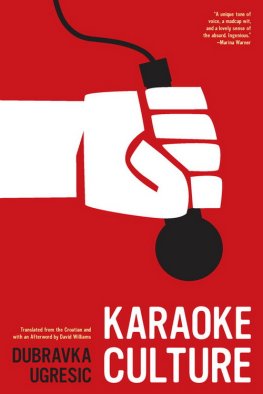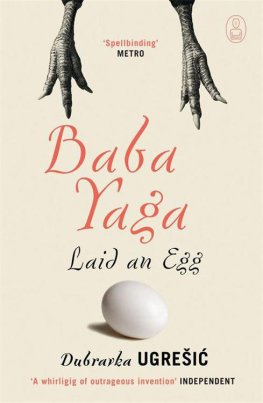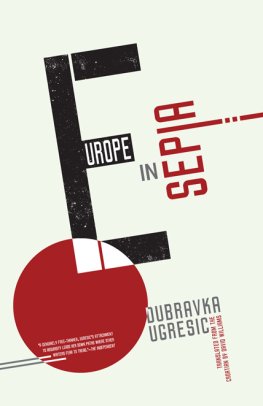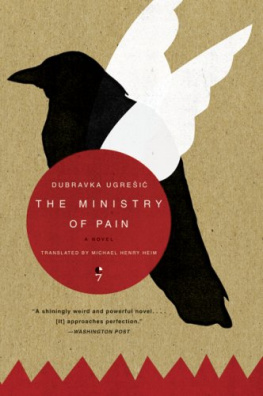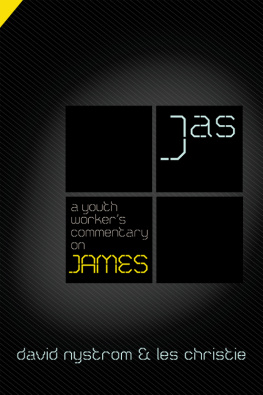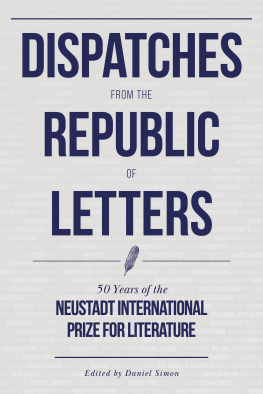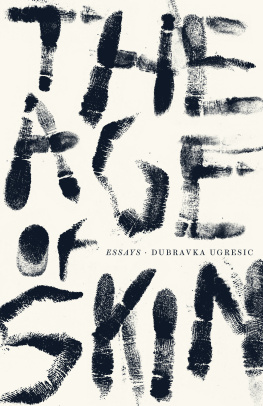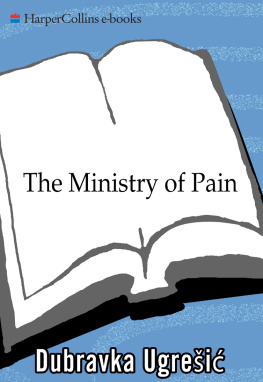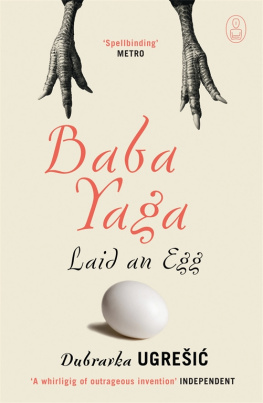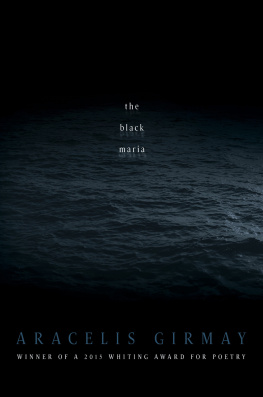Dubravka Ugresic - Karaoke Culture
Here you can read online Dubravka Ugresic - Karaoke Culture full text of the book (entire story) in english for free. Download pdf and epub, get meaning, cover and reviews about this ebook. year: 2011, publisher: Open Letter, genre: Non-fiction. Description of the work, (preface) as well as reviews are available. Best literature library LitArk.com created for fans of good reading and offers a wide selection of genres:
Romance novel
Science fiction
Adventure
Detective
Science
History
Home and family
Prose
Art
Politics
Computer
Non-fiction
Religion
Business
Children
Humor
Choose a favorite category and find really read worthwhile books. Enjoy immersion in the world of imagination, feel the emotions of the characters or learn something new for yourself, make an fascinating discovery.
- Book:Karaoke Culture
- Author:
- Publisher:Open Letter
- Genre:
- Year:2011
- Rating:5 / 5
- Favourites:Add to favourites
- Your mark:
- 100
- 1
- 2
- 3
- 4
- 5
Karaoke Culture: summary, description and annotation
We offer to read an annotation, description, summary or preface (depends on what the author of the book "Karaoke Culture" wrote himself). If you haven't found the necessary information about the book — write in the comments, we will try to find it.
Karaoke Culture — read online for free the complete book (whole text) full work
Below is the text of the book, divided by pages. System saving the place of the last page read, allows you to conveniently read the book "Karaoke Culture" online for free, without having to search again every time where you left off. Put a bookmark, and you can go to the page where you finished reading at any time.
Font size:
Interval:
Bookmark:
Dubravka Ugresic
Karaoke Culture
1.
And by the mid-afternoon he was again overcome with the desire to be somewhere else, someone else, someone else somewhere else.
Jonathan Safran Foer, Everything Is Illuminated2.
Help me. I had a dream last night. I was skipping through a meadow holding a picnic basket and the basket was marked Options. And then I saw there was a hole in the basket.
Mr. Kugelmass, the worst thing you could do is act out. You must simply express your feelings here, and together well analyze them. You have been in treatment long enough to know there is no overnight cure. After all, Im an analyst, not a magician.
Then perhaps what I need is a magician, Kugelmass said, rising from his chair.
Woody Allen, The Kugelmass Episode3.
. . But one day
The sun will stand where the heart once stood
And there will be no words in human speech
That a poem would renounce
Everyone will write poetry. .
Branko Miljkovi, Everyone Will Write Poetry4.
We human beings hog the limelight on this new stage of democratized media. We are simultaneously its amateur writers, its amateur producers, its amateur technicians, and, yes, its amateur audience. Amateur hour has arrived, and the audience is now running the show.
Andrew Keen, The Cult of the Amateur: How Todays Internet Is Killing our Culture1. KARAOKE CULTURE
1. WHY KARAOKE, AND WHATS CULTURE GOT TO DO WITH IT?
It needs to be said upfront: Im not a karaoke fan. This essay was not only conceived, but also half-finished, when it occurred to me to go and catch a bit of real karaoke. They say Casablanca is the most popular karaoke bar in Amsterdam. My companion and I, both neophytes, arrived at eight on the dot, as if we were going to the theatre and not a bar. Casablanca was empty. We took a walk down Zeedijk, a narrow street packed with bars whose barmen look like they spend all day at the gym and all night in the bar. Muscles and baggy eyelids that pretty well describes our barman at Casablanca, to which we soon returned. On a little stage, two tall, slender young women were squawking a Dutch pop song into a couple of upright microphones. A concert featuring Dutch pop stars played on the bars TV screens but was drowned out by the evenings young karaoke stars. The girls sang with more heart than the guys, and for a second I thought there must be an invisible policeman standing over them. The whole thing was a deaf collective caterwaul: deaf insofar as nobody actually listened to anyone. Amsterdam is definitely not the place for a karaoke initiation. Im not sure why I even thought of going to see karaoke in Amsterdam maybe because of the paradox that sometimes turns out to be true, that worlds open up where we least expect.
I was watching the film Lost in Translation for the third time and had stopped at the part where Bill Murray, with fatalistic forbearance, does his karaoke number. I sat down at the computer and opened YouTube. Trailing a few words behind and holding out little hope that Id ever catch up, I gave singing I Will Survive a go. It was an invigorating experience. I had a go at opera too. I managed to warble along with a popular aria from The Phantom of the Opera, but on Andrea Bocellis Con Te Partir I could only get my tongue around the first line of the chorus. That song definitely has too many unpronounceable words.
I thought about buying the karaoke version of Ti Voglio Tanto Bene for $2.99, but gave it a pass. I didnt buy Cantolopera either, which would have let me sing operatic arias accompanied by a whole orchestra. I didnt even buy a teach-yourself pack, a virtual coach for classical singers. But when I saw an Internet ad for a karaoke program that promised to recreate the joys, sorrows, ecstasy and anguish of operawhile I was having my morning shower I very nearly caved. Its not that I like warbling in the shower; its just that Im a sucker for emotionally charged ads with rich vocabularies. And I almost forgot, I also listened to a few karaoke singers on a site called Singers Showcase. My favorite was the sad Mr. Sandy and his bear-like growl through Georgia On My Mind.
What is karaoke in actual fact? Karaoke (Japanese for empty orchestra) is entertainment for people who would like to be Madonna or Sinatra. The karaoke machine was invented in the early seventies by the Japanese musician Daisuke Inoue who forgot to patent his invention, and so others cashed in. A few years ago Inoue apparently won the alternative Nobel Peace Prize (the Ig Nobel), awarded by The Annals of Improbable Research. They praised him for providing an entirely new way for people to learn to tolerate each other.
Cultural critics are people who are prepared to see more in the craze for tattoos than just a passing fashion fad. Im a member of this dubious guild. In karaoke Im ready to see more than just desperate squawking to the backing track of I Will Survive. Karaoke supports less the democratic idea that everyone can have a shot if they want one and more the democratic practice that everyone wants a shot if theres one on offer. The inventor of karaoke, Daisuke Inoue, is a humble man, most proud of having helped the Japanese, emotionally reticent as they are said to be, change for the better. As Pico Iyer wrote: As much as Mao Zedong or Mohandas Gandhi changed Asian days, Inoue transformed its nights.[1]
What is the attraction of karaoke, which having first taken off in Japan (apparently its still going strong) then made its way around the world? I suspect it is firstly its simplicity and stupidity, and secondly, the ambivalent position of the participant. Singing a song that someone else made famous, the amateur publicly declares his or her love for his or her idol (Sinatra or Madonna), while the inevitably flaky performance simultaneously devalues this same idol. This theft of the stars aura, or inadvertent subversion of a hierarchy of values, remains in the sphere of the innocent, empowering, and transformative. Its just a bit of fun. The performer is anonymous, and most often remains so.
Letting ones imagination run wild, its not difficult to imagine various other forms of karaoke-like fun. Someone with a bit of cash, for example, might hit upon the idea of hiring the ballet ensemble of the Bolshoi Theatre, commission a performance of Swan Lake, and insert his wife, mother-in-law, or even himself in the main dance section. The variants are endless. But the bottom line, it seems, is anonymity. Why? If we signed our first and last names, our gesture would have a completely different message. Our squawking along to Mamma Mia wouldnt be interpreted as a submissive imitation of the original, but as subversion, homage, parody, and so forth. An authorial gesture, as opposed to an anonymous one, sends a rather different message out into the world Marcel Duchamp painting a mustache and beard on the Mona Lisa or Andy Warhol and his giant celebrity portraits come to mind. Were it not for an authorial signature, and general agreement that this signature be respected, much contemporary art the product of an inseparable symbiosis between someone elses original model and an interventionist authorial gesture could easily be filed under less flattering labels such as symbiotic art, appropriation art, or karaoke art. Because karaoke is an activity that belongs to those who dont sign their names or dont do so for now. For the time being, karaoke-people stick within their communities, their fandoms.
There are of course inverse examples, where famous people do karaoke. The film Romance & Cigarettes (2005), a kind of karaoke-musical, stars superb actors (James Gandolfini, Susan Sarandon, Kate Winslet, and Steve Buscemi) who ham it up to the sound of others booming voices, not least that of a certain Tom Jones.
Font size:
Interval:
Bookmark:
Similar books «Karaoke Culture»
Look at similar books to Karaoke Culture. We have selected literature similar in name and meaning in the hope of providing readers with more options to find new, interesting, not yet read works.
Discussion, reviews of the book Karaoke Culture and just readers' own opinions. Leave your comments, write what you think about the work, its meaning or the main characters. Specify what exactly you liked and what you didn't like, and why you think so.

